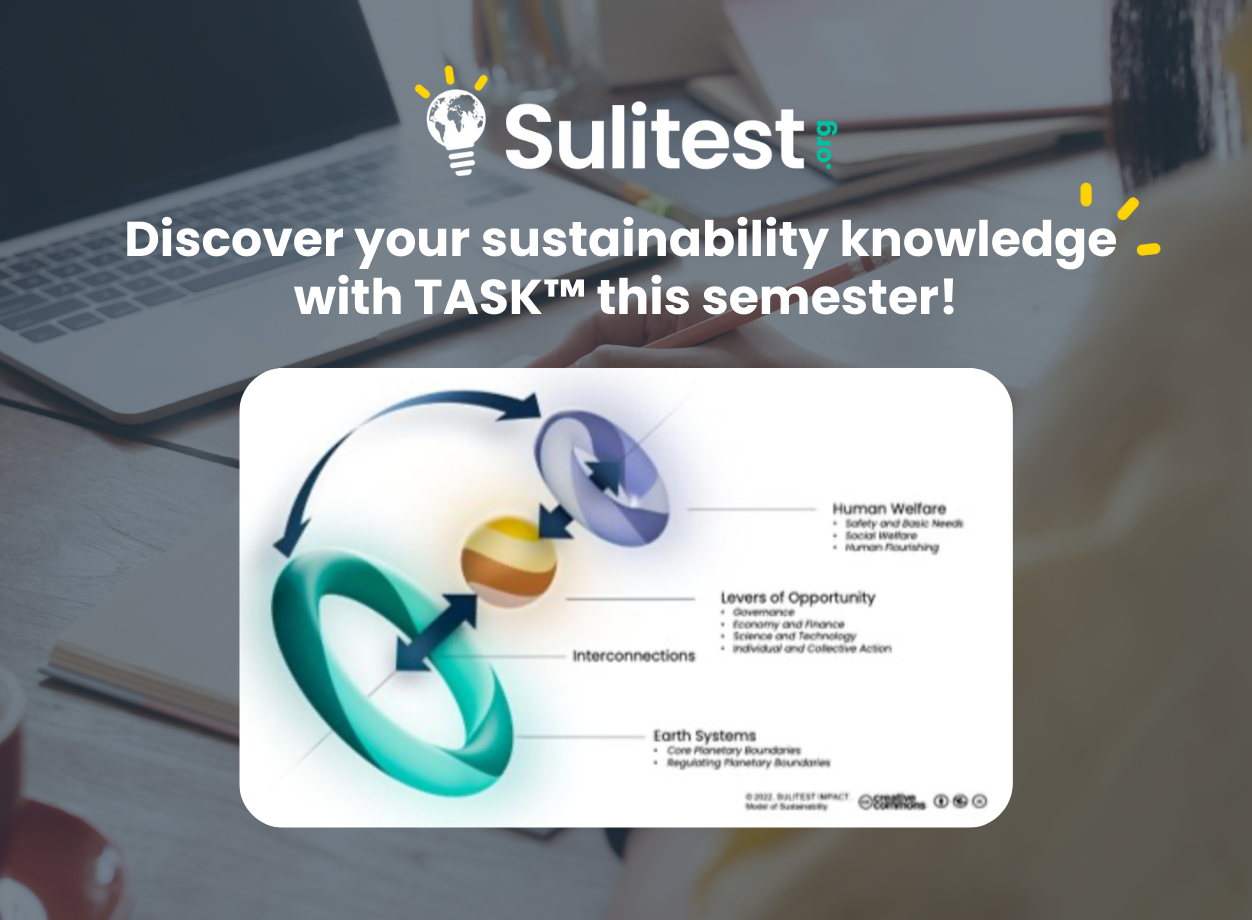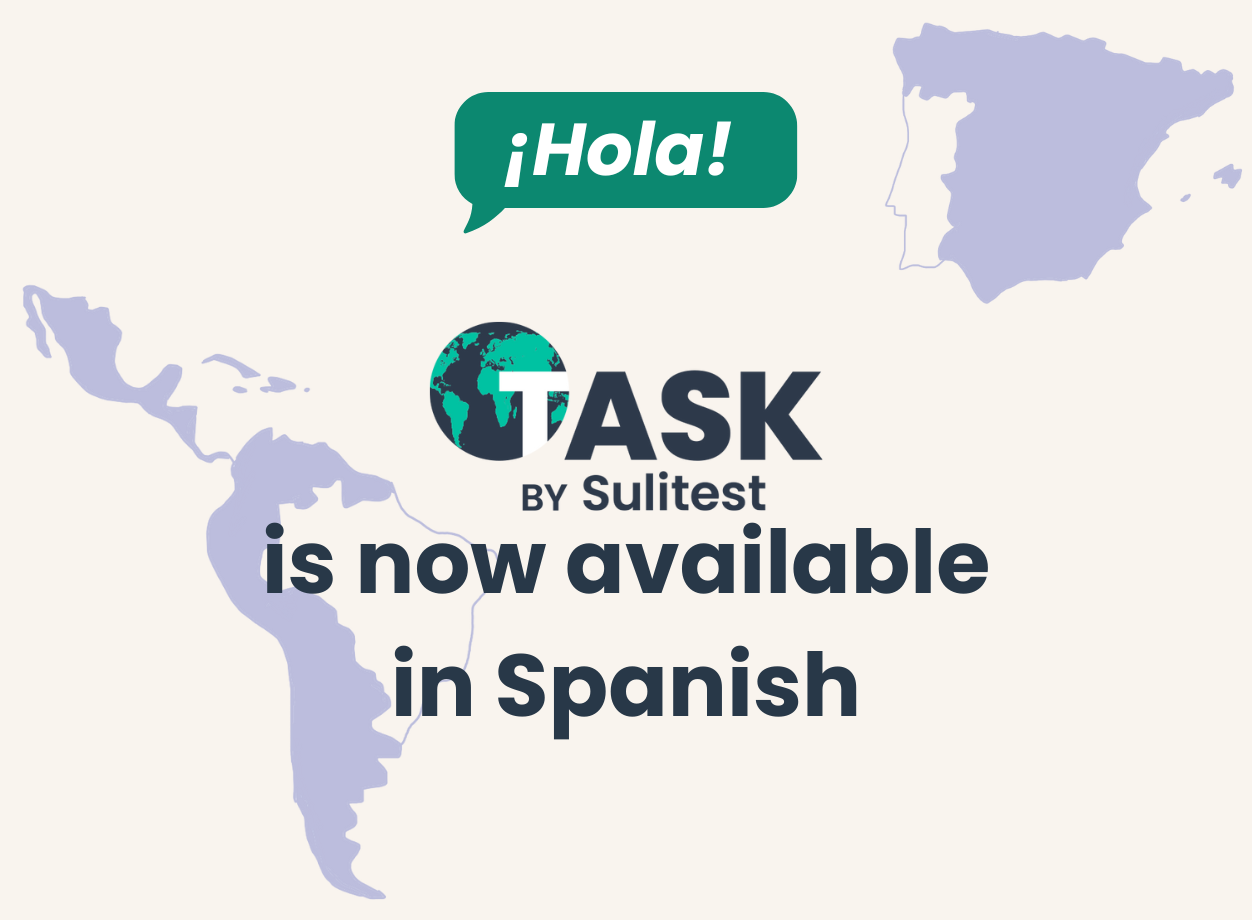
An academic year with purpose: Advice for students taking TASK™

The start of a new academic year is just around the corner, and we would like to address the thousands of students who will be interacting with TASK™.
Students, welcome to your sustainability assessment and learning compass!
As you settle into a new term and courses, we want to bring purpose and sustainability to your learning journey. If you have been invited to take TASK™, this blog featuring practical insights is for you.
First things first...
What is TASK™?
TASK™ stands for The Assessment of Sustainability Knowledge. It is a multiple-choice assessment that you will be taking online. You will be asked about sustainability through 112 questions that you will have 80 minutes to answer.
Your degree is preparing you for a world that demands innovative, responsible decision-making. Your university or school is offering you to take TASK™ to gain a better insight into how much you understand about the key subjects within sustainability. This will act as a learning compass for you, enabling you to understand your strengths and the areas that might need some improvement.
TASK™ also allows your institution to measure the impact of their educational offerings. The insights provided help institutions ensure their programs are equipping graduates with the ability to "talk sustainability", to understand the challenges, trends and interconnections.
Why does TASK™ matter?
From a student’s perspective:
- TASK gives you direct, scientifical yet approachable knowledge of the multiple crises the Earth is currently facing. Taking this assessment will make you more aware of global issues and their interconnections.
- You will have a broader impact by supporting your university's sustainability goals and therefore will contribute to more conscious career development and sustainability literacy building.
- Sustainability is increasingly linked to employability, as it is becoming a skill employers seek. You could therefore even choose to add your TASK™’s certificate to your resume or your LinkedIn profile to show your commitment and start conversations.
- TASK™ will encourage you to dig deeper and understand how your field can be connected to sustainability. As your knowledge of the subject increases, you will be more equipped to make informed decisions in your future career.
How to succeed at TASK™ – Practical tips
TASK™ is not about passing or failing, but rather of understanding where you are in your own sustainability learning journey and informing your next steps. Taking the assessment honestly and preparing for it is key to making the most of the experience.
Here are some tips:
1. Understand the scope
TASK™ embodies a large range of questions and subjects. Overall, there are three “themes”–Earth Systems, Human Welfare, and Levers of Opportunity–and various subjects within each. Read our TASK™ position paper to learn more.
.png)
There is no need to be an expert in biodiversity or climate. This assessment is said to be difficult, and it can be, as sustainability is a transdisciplinary science. But TASK™ is not designed to catch you in particular numbers or niche concepts. Our vision is that every student have a foundational knowledge of the challenges we collectively face, their causes and impacts, and how to address them.
Nevertheless, developing critical thinking and getting a better idea of the key trends by reading the news and staying informed is valuable. Being aware of the latest trends will make you more precise in your knowledge of sustainability as well as helping you not to be overly surprised by what is discussed in TASK™.
2. Review content and think interdisciplinarity
- Take Intro2TASK, our preparatory learning pathway! You’ll find selected resources (mostly short videos or interactive websites) to enable you to grasp all the exciting knowledge in TASK™. We cannot promise you will learn everything about sustainability in just 5 hours, but it will provide you with a much better idea of what you will encounter in the assessment.
- Review resources around sustainability offered by your university and speak with your professors. You can even join or start a club to discuss sustainability with other students!
- Sustainability isn’t just about the environment: it’s also economic, social, political, technological, and cultural. That’s why it’s so important to think beyond your own academic field. Real-world challenges don’t come in neat boxes and solving them requires cognitive flexibility and insights from across disciplines. Whether you're studying business, engineering, or the arts, approaching sustainability from different angles helps you see the bigger picture. So, get curious: read beyond your field, take a course in another discipline, or talk to students with different perspectives. It’s a simple way to expand your understanding of sustainability.
3. Talk to your colleagues
- You can discuss sustainability with classmates or clubs. This will also reduce the eco-anxiety you may be feeling if you’re overwhelmed by the discovery of how worrying those crises are.
- If you can learn with your peers and work together, not only will it make you feel less alone, but you’ll also just remember things more easily by saying them out loud.
- Speaking with alumni who are now working in the field can help you picture a future path where you can have more purpose in your career. Understanding better how to use all that knowledge in your future career will make it seem more worthwhile.
- Last but certainly not least, get out there and get to know your community! Sustainability knowledge is applicable and touches every part of our lives, and getting into action will help you and the community around you.
Final thoughts: Your sustainability journey starts here
TASK™ isn’t just an assessment; it is a starting point for becoming sustainability-literate. It is a great first step, but you should not stop there. Be curious and try to learn more about sustainability, biodiversity, social justice, climate change and so on. Thanks to TASK, you can identify gaps in your knowledge and learn more about them.
We hope you enjoyed that article and that it was helpful to you. If so, you can share it with friends or classmates!
If you would like to contribute to further discussions about TASK or sustainability literacy in general, you can always contact us.












